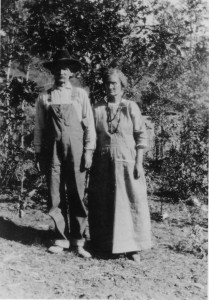Like millions of other Americans, I have always been fascinated by old family stories and genealogy. I’ve spent more time than most researching the family tree, but the stories are much more enlightening than just names and dates.

My great-grandparents both came to Colorado with their folks when they were still children, at the close of the Civil War.
I recently came across a story about one branch of this family, not especially different than thousands of others except that one took time to write down his experiences. He recounted their history more eloquently than you might expect, considering what we now think of as a fairly rudimentary education. But he sums up the life of one pioneer perfectly:
“My father had come here with a wife and five children, eight cows, two horses and a wagon, and very little else. He left this life with very little more, except the number of children had grown to eight. We had all worked hard and lived hard. But when I think back over it all, remembering the destitution, the bad luck, the poor crops, and the tremendous needs of those times, I am led irrevocably to the conclusion that my parents must have been magicians, endowed with the power to create substance where there was nothing.”
In fact, after recalling that the kids always were in school when it was available, that they always seemed to have shoes on their feet and a roof over their heads, and that nobody ever starved, the author was moved to conclude, “It might be subject to question, after all, whether my father was ever a poor man at all.”
That was written by an ancestor on my father’s side, around 1930 while the memories still seemed fresh. My mother’s ancestors also came to Colorado early, in the aftermath of the bitter and divisive Civil War, half of them from the North and half from the South. But despite the horrors of brothers fighting on opposite sides and never seeing one another again, and the fresh memories of unspeakable horrors, they brought everything they could carry and walked most of the way to Colorado, my great-great grandmother pregnant throughout the arduous trip and her husband already nearly 70 years old.
All these ancestors had something in common that modern generations should study, remember, and pass on to future generations. They had a deep understanding of the relationship between people and their environment that did not need a name. They didn’t need to belong to organizations or pay dues to lobbying groups. They sank very deep roots and loved Colorado with an almost spiritual reverence. They depended on the land, the water, the timber, the minerals, and the wildlife for their very survival – so they also understood the need for good stewardship. They didn’t call it that. They called it common sense.
Today the politics of these issues are dominated by interest groups, not ordinary working people. Politicians and officials in Washington, D.C. presume not only to know better how to manage the resources around us, but openly distrust the locals. I used to make a big point of acknowledging that the early settlers were not perfect and made some serious mistakes in the way they treated nature. But now….
When I watch the U.S. Forest Service allow the national forests to die and burn; or when I watch the arrogance of the EPA poisoning the Animas River and acting like nothing happened (while they jail and fine others); or look at a national government seeking to regulate virtually every aspect of our daily lives while spending the country into bankruptcy – I look more fondly on the wisdom of the old timers, whose lives were harder but also simpler. Maybe we all still have a lot to learn from our own history.
(A version of this column appeared in the Grand Junction Daily Sentinel September 18, 2015)




Comments on this entry are closed.